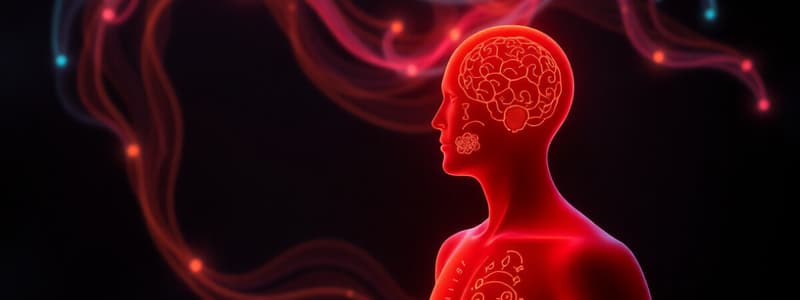Podcast
Questions and Answers
What role do the lungs play in maintaining blood pH?
What role do the lungs play in maintaining blood pH?
- They reabsorb hydrogen ions.
- They produce carbonic acid.
- They expel carbon dioxide. (correct)
- They bind hydrogen ions.
The endocrine system responds to stimuli faster than the nervous system.
The endocrine system responds to stimuli faster than the nervous system.
False (B)
What is the primary function of the kidneys in blood pH regulation?
What is the primary function of the kidneys in blood pH regulation?
To excrete or reabsorb hydrogen ions.
The chemical messengers produced by glands in the endocrine system are called ______.
The chemical messengers produced by glands in the endocrine system are called ______.
Match the components of the nervous system with their functions:
Match the components of the nervous system with their functions:
What is the main purpose of homeostasis in an organism?
What is the main purpose of homeostasis in an organism?
All animals maintain a constant body temperature regardless of their environment.
All animals maintain a constant body temperature regardless of their environment.
What role does the hypothalamus play in temperature regulation?
What role does the hypothalamus play in temperature regulation?
The pancreas regulates blood glucose levels by secreting __________.
The pancreas regulates blood glucose levels by secreting __________.
Match the following processes with their functions in homeostasis:
Match the following processes with their functions in homeostasis:
What condition occurs when the pancreas does not produce insulin?
What condition occurs when the pancreas does not produce insulin?
Dehydration can result from lack of water intake or excessive water loss.
Dehydration can result from lack of water intake or excessive water loss.
What is the consequence of high blood glucose levels?
What is the consequence of high blood glucose levels?
Flashcards
Maintaining Blood pH
Maintaining Blood pH
The body's method of keeping blood pH stable, using buffer solutions to quickly absorb excess hydrogen ions (H+).
How do the lungs help maintain blood pH?
How do the lungs help maintain blood pH?
Organs that help regulate blood pH by removing carbon dioxide (CO2), which forms carbonic acid in water.
How do the kidneys help maintain blood pH?
How do the kidneys help maintain blood pH?
Organs that excrete or reabsorb hydrogen ions (H+) to fine-tune blood pH balance.
What is a stimulus?
What is a stimulus?
Signup and view all the flashcards
What is the nervous system?
What is the nervous system?
Signup and view all the flashcards
What is homeostasis?
What is homeostasis?
Signup and view all the flashcards
Describe a negative feedback loop.
Describe a negative feedback loop.
Signup and view all the flashcards
How does the body regulate temperature?
How does the body regulate temperature?
Signup and view all the flashcards
What is endothermy?
What is endothermy?
Signup and view all the flashcards
Explain blood glucose regulation.
Explain blood glucose regulation.
Signup and view all the flashcards
What is water balance?
What is water balance?
Signup and view all the flashcards
Why is blood pH regulation important?
Why is blood pH regulation important?
Signup and view all the flashcards
What is type 2 diabetes?
What is type 2 diabetes?
Signup and view all the flashcards
Study Notes
Homeostasis
- Homeostasis is the maintenance of a stable internal environment in an organism.
- This includes maintaining constant internal temperature, blood glucose concentration, water balance, and blood pH.
- A stable internal environment allows enzymes to function efficiently and metabolic reactions to proceed.
- Homeostatic mechanisms frequently use negative feedback loops.
Negative Feedback Loops
- A negative feedback loop is a cyclical process that reduces the effect of a stimulus.
- The process involves detecting change, responding to counteract the change, and maintaining a stable level.
- For example, if body temperature rises, mechanisms are activated to cool the body down and reduce the temperature.
Body Temperature Regulation
- Maintaining a consistent body temperature is essential for optimal organism function.
- The hypothalamus in the brain acts as a thermoregulatory center.
- When body temperature rises, the hypothalamus initiates sweating to cool the body through evaporation.
- If body temperature drops, the hypothalamus triggers shivering to generate heat.
- Mammals and birds are endotherms, maintaining a constant internal temperature.
- Other animals (ectotherms) rely on external heat sources.
Blood Glucose Regulation
- Blood glucose concentration needs precise regulation.
- High blood glucose can damage blood vessels.
- The pancreas regulates blood glucose by secreting hormones.
- Insulin lowers blood glucose levels.
- Glucagon raises blood glucose levels.
- Type 1 diabetes occurs when the pancreas doesn't produce insulin, leading to high blood glucose.
- Type 2 diabetes occurs when body cells don't respond to insulin, also leading to high blood glucose levels.
Water Balance
- Water balance is crucial for homeostasis.
- The body needs to maintain a specific amount of water in its cells.
- The kidneys play a key role in regulating water balance.
- The kidneys filter blood and reabsorb water as needed, excreting excess as urine.
- Excessive water intake can lead to water poisoning or hyponatremia.
- Dehydration, from decreased water intake or excessive loss, can cause significant health issues.
Blood pH Regulation
- Blood pH must be maintained within a narrow range to avoid enzyme damage.
- Buffer solutions quickly bind to and remove excess hydrogen ions (H+), helping to maintain pH.
- Lungs and kidneys are both vital for pH regulation.
- The lungs expel CO2, reducing carbonic acid and influencing pH.
- The kidneys excrete or reabsorb hydrogen ions to maintain blood pH balance.
Response to Stimuli
- Organisms respond to environmental changes.
- A stimulus is an environmental change.
- Receptors detect stimuli.
- Effector organs respond to stimuli.
- Nerves transmit messages throughout the body.
The Nervous System
- The nervous system is responsible for rapid responses to stimuli.
- It involves sensory neurons, relay neurons, and motor neurons.
The Endocrine System
- The endocrine system controls slower responses to maintain homeostasis.
- It uses glands and hormones.
- Hormones are chemical messengers that travel through the bloodstream to target cells.
Studying That Suits You
Use AI to generate personalized quizzes and flashcards to suit your learning preferences.




